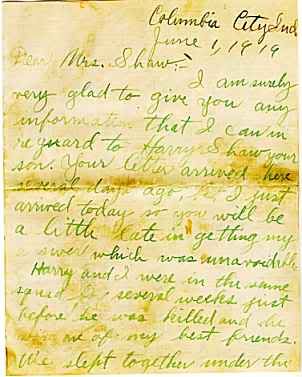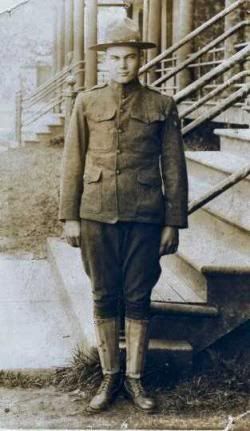MURDER, POLITICS, AND THE END OF THE JAZZ AGE
by Michael Wolraich
He sits quietly
with a small flag in his hands
haunted by foxholes.

Columbia City, Ind.
June 1, 1919Dear Mrs. Shaw:-
I am surely very glad to give you any information that I can in reguard to Harry Shaw your son. Your letter arrived here several days ago, but I just arrived today so you will be a little late in getting my answer which was unavoidable.
Harry and I were in the same squad for several weeks just before he was killed and he was one of my best friends. We slept together under the same tent, so were quite well aquainted. We were in the battle together where he was wounded. He did not die then or there, but later back in the hospital, so I was not near him when he died.
I will give you here an account as nearly as I can explain it in writing. On July 30 we left the place in the woods about six or eight miles north of Chateau Thierry where we had been for four or five days behind the lines. About twelve o’clock that night we reached the front lines and took the places of other men who had been there several days and who then went back in the woods to rest. We lay in the holes in the ground that these other men had dug all the rest of the night and the forenoon of July 31. About two o’clock in the afternoon we received orders to advance towards the Germans. We started about 2:30 o’clock.
The Germans commenced to shoot at us as soon as we started with artillery and machine guns.
Our company went forward in what we call four “waves”. A wave is a line of men all marching side by side about five yards apart. Each wave marched one behind the other regulating the speed of our march so that the waves would follow each other at a distance of about fifty yards. Harry was the first man on my left so that we were sepperated only about five yards and we were in the third wave.
We advanced down a large hill, across a valley and about half way up another hill without very many men getting wounded and only one man killed. The machine guns bullets then began to come so thick and fast that we were compelled to lay down on the ground or crawl in shell holes to prevent being hit. From there on we went on by short rushes, one or two of us would get up and run a short distance forward and then drop down and wate until the rest came up in the same wave. In this manner there would only be a few men exposed to the German rifle fire at one time.
It was in one of these short bursts that Harry was hit by a machine gun bullet. The bullet hit him in the front abdomen and passed out through the middle of the back, cutting the spinal nerves and caused his lower limbs to be paralyzed. He was about forty yards behind me when he was hit.
I called back to Lieutenant Alston Ward who then was only a few yards in front of Harry. The Lieutenant got up ran over to him, picked him up and placed him in a shell hole nearby where he would be safe from more bullets. A little later two stretcher carriers came up with a stretcher and carried him back to the rear, and then Lieutenant came up to where I was. It was then that I got the information from the Lieutenant as to the character of Harry’s wound. The Lieutenant also said that Harry said it did not pain him much but caused a numb feeling in his back and legs.
I did not talk to Harry after he was wounded and the only one who did that I knew by name was the Lieutenant mentioned above. The Lieutenant left our Company soon after and returned to the United States. You could get more information likely by writing to him and could get his address from the Commander of E Co. who was John Hynan of Flint.
Just before they carried Harry over the hill out of sight I saw him wave his hand back at us. He had a smile on his face and called something but it was too far for us to hear what he said. He was likely bidding us good by as he knew of course that they would send him immediately back to the hospital.
One of the men who carried him back and put him in a motor ambulance told me next morning that Harry told him to tell me that he did not think he was hurt very bad and that he would be all right sometime. I suppose the wound was numbed and did not pain him much so that he did not realize how bad he was hurt.
I herd two or three weeks later that Harry died in the hospital. I know that he did not die on the battle field, and that he was placed on an ambulance and left there for the hospital. Many soldiers who have been wounded in battle have passed through the same experience of having the wound feel numb and feel little pain. That was my experience also when I was wounded about a month later.
I am not a very good writer, and in this letter I may not have made some things very clear. If so and there is anything that you would wish me to speak more of I will be very glad to do so.
Most Sincerely
Ralph Elder
This is the letter Mary Shaw received from Mr. Elder after asking for more information about her son, Harry, and how he had died in the Second Battle of the Marne of WWI.
I have shown only the first page of the eight page letter. From the handwriting it is clear Mr. Elder is quite shattered from his experience at war. The noise. The smoke. The smell. The sight of seeing his best friend cut through by machine gun fire. Being wounded himself. Poor handwriting is no excuse because after connecting with his grandnieces and nephews, (the wonders of the internet) I learned Mr. Elder had excellent handwriting, bordering on calligraphy. After sending them copies of the letter, they were stunned by the sloppiness of his script.
By the way, Harry Shaw was my great-uncle.

And Ralph Elder was his friend during wartime in France, and a comfort to his mother at home.
I can think of no other reason for that letter to have survived nearly a hundred years other than it being the last tangible link to a son killed so far away from home.
So, this is the way I am remembering on Memorial Day. I am not going to march in a parade. I am not going to stick a little flag in the ground at the local cemetery. I'm just going to remember.
Although...
writing this has been a little more emotional for me than it should be considering this isn't the first time I have shared Mr. Elder's letter and my great-grandmother's quiet sorrow. Maybe I'm getting sappy in my old age. Or maybe I am just feeling a deeper hurt when it comes to soldiers killed in war. How it hurts a mother. How it hurts a best friend. How it hurts a nation's spirit. It just hurts.
And all we can do for the dead soldiers is give them a day to make us feel better.
It doesn't seem quite enough.
Comments
A Beautiful piece of writing, flowerchild. Thank you for sharing this letter. It is important that we save these pieces of our family's emotional history. Thank you too for including my haiku in your intro. I feel honored.
by MrSmith1 on Sun, 05/24/2015 - 11:37pm
Actually, Mr. Smith, it was your haiku that inspired me to share the letter.
"haunted by foxholes"
That one line sparked the idea, so it should be me thanking you and any honor you feel is well deserved.
by wabby on Mon, 05/25/2015 - 8:56am
Wonderful. Perfect for today.
We have had too many years with "chicken hawks" belittling the people who want to avoid war in news programs. We all need to remember what war does to lives.
by trkingmomoe on Mon, 05/25/2015 - 3:28am
We do need to remember the personal cost of war, momoe.
I wonder how many members of Congress have kids in the military? About 1%, according to this ABC article from 2006. How can someone so far removed from war be trusted to decide when war must be waged?
by wabby on Mon, 05/25/2015 - 9:12am
Thank you, flower. This is a touching reminder of so much that we forget ... including the intimacy of a handwritten letter. It's the only form of non-verbal communication that can convey the emotion and subtleties of the person behind the words. In this particular case, its very simplicity bares the heart of a young man struggling to find the right ones. Both he and your great-uncle are alive on the page, and that's a precious thing.
by barefooted on Mon, 05/25/2015 - 4:33pm
Alive on the page, indeed. Thank you Missy.
by wabby on Mon, 05/25/2015 - 8:35pm
Beautiful, Flowerchild. I've been away from my computer for a couple of days and almost missed this. So glad I didn't.
What terrible things both the living and the dead have to go through in wartime. I think it's time the leaders of this country experienced a little of it first-hand. They wouldn't be so quick to send others out there to fight their battles for them.
by Ramona on Tue, 05/26/2015 - 9:31pm
Abolish the U.S. military and it won't happen anymore.
by Aaron Carine on Mon, 06/01/2015 - 7:26am
All militaries would have to be abolished for it not to happen anymore, not just ours.
by wabby on Mon, 06/01/2015 - 9:29am
Thanks for the post. Love this post.
by Trucker (not verified) on Mon, 06/01/2015 - 9:37am
You're welcome, Trucker and thanks for taking the time to read.
by wabby on Mon, 06/01/2015 - 9:49am